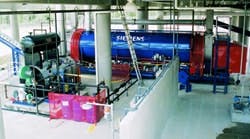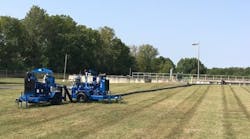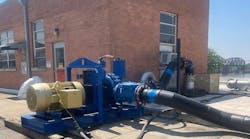The City of Ocala, Fla., has three water reclamation facilities (WRFs) that participate in the city’s aggressive biosolids reuse program. Ocala’s newest facility, known as WRF #3, will eventually process all citywide biosolids.
After some thought, the city decided to produce Class AA product at WRF #3 for a number of reasons. The loss of over 1,000 acres of Class B land-application sites to new development, the unreliability of long-term landfilling and associated tipping fees, continuing increases in transportation costs, more restrictive future biosolids regulations, the ability to reduce the overall amount of biosolids generated, and the marketability of the Class AA end-product all led to the final decision.
The right fit
Ocala chose the Dragon Dryer system from Siemens Water Technologies to serve as the core of WRF #3’s beneficial biosolids reuse program. The rotating-chamber indirect heat dryer receives dewatered biosolids from a belt press, 18% of which are dry solids. The dryer processes these biosolids by conduction heat drying so they comply with the federal and state government’s respective Class A and AA biosolids requirements. The dried biosolids are then discharged from the dryer at 90%-plus dry solids and sold as a beneficial reuse product.
The Dragon Dryer system processes on average 40.53 wet tons per day of biosolids. The dryer uses 1,485 BTUs of gas per pound of water evaporated, with an average evaporation rate of 2,716 lb of water removed per hour. Characteristics of the dried biosolids include: 79% reduction in volume, 84% reduction in weight, and 92% average solids.
Results
Ocala’s Class AA end product is considered a low-grade, slow-release organic fertilizer and excellent soil amendment. Central Florida’s orchard owners and others in the agricultural industry directly apply the product in bulk. The city has also sold several 20-lb bags of the material to raise money for local charities and to help increase product awareness. In the future, the city hopes to also interest nurseries, landscapers, homeowners and other potential users in the product.
Joey Herndon is the business development manager - Biosolids Drying for Siemens Water Technologies. He can be reached at 229/227-8727 or by -email at [email protected].


